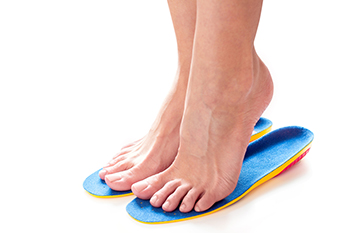
Orthotics are inserts that are put inside the shoes which can help to correct problematic foot structures. People who have flat feet, high arches, or foot conditions such as arthritis and plantar fasciitis may benefit from wearing orthotics. Soft, rigid, and semi-rigid are the different types of orthotics to choose from, and each kind is designed to provide the desired results for the specific foot condition. Soft orthotics may provide cushioning that can help to absorb shock, in addition to reducing pressure while walking. Plastic or graphite materials are used to make rigid orthotics, which and may help to improve alignment and movement. The most common types of orthotics are semi-rigid and are constructed with flexible materials that lie over a firm bottom layer. People who have diabetes may wear orthotics as a method of preventing sores or blisters from developing. If you would like to have more knowledge about orthotics, it is suggested that you confer with a podiatrist who can provide you with the information you are seeking.
If you are having discomfort in your feet and would like to try orthotics, contact Zina Cappiello, DPM from Dr. Zina B. Cappiello DPM, LLC. Our podiatrist can provide the care you need to keep you pain-free and on your feet.
What Are Orthotics?
Orthotics are inserts you can place into your shoes to help with a variety of foot problems such as flat feet or foot pain. Orthotics provide relief and comfort for minor foot and heel pain but can’t correct serious biomechanical problems in your feet.
Over-the-Counter Inserts
Orthotics come in a wide variety of over-the-counter inserts that are used to treat foot pain, heel pain, and minor problems. For example, arch supports can be inserted into your shoes to help correct overarched or flat feet, while gel insoles are often used because they provide comfort and relief from foot and heel pain by alleviating pressure.
Prescription Orthotics
If over-the-counter inserts don’t work for you or if you have a more severe foot concern, it is possible to have your podiatrist prescribe custom orthotics. These high-quality inserts are designed to treat problems such as abnormal motion, plantar fasciitis, and severe forms of heel pain. They can even be used to help patients suffering from diabetes by treating foot ulcers and painful calluses and are usually molded to your feet individually, which allows them to provide full support and comfort.
If you are experiencing minor to severe foot or heel pain, it’s recommended to speak with your podiatrist about the possibilities of using orthotics. A podiatrist can determine which type of orthotic is right for you and allow you to take the first steps towards being pain-free.
If you have any questions please contact our office located in Clifton, NJ . We offer the newest diagnostic and treatment technologies for all your foot and ankle needs.
